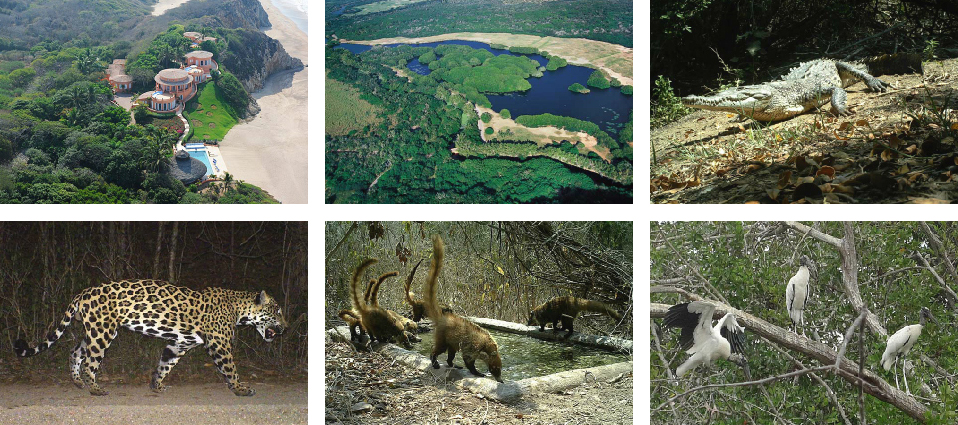In 1990, Sir James announced the ‘active business chapter’ of his career was closed. He took on a new role as the chief executive of The Goldsmith Foundation in 1991, and directed his considerable energy towards furthering a debate on environmental and humanitarian issues.

Sir James’s elder brother, Edward ‘Teddy’ Goldsmith, was undoubtedly a huge influence. As the founding editor of The Ecologist magazine, Teddy was a pioneer in the field and drew attention to climate change, damage to the rainforests, and the use of chemical pesticides long before many scientists took these issues seriously. Sir James also started early – quietly supporting a number of ecological causes in the early 1970s, and creating in 1971, at Teddy’s request, the left-leaning Ecology Foundation.
“Everything is unimportant compared to the protection of our planet. We have destroyed our seas, our air, our forests – and we will ultimately destroy ourselves … I feel like someone who had been dealt a winning hand at poker when sailing on the Titanic.”
Philanthropist
“The right should not abandon the overwhelming issues facing the world to the left”
During the last seven years of his life Sir James became increasingly involved in philanthropic work, and began to actively support more environmental causes with the encouragement of his brother Teddy. The Goldsmith Foundation, created for this purpose, had virtually no public profile, as Sir James was not motivated by outside acclaim. The Foundation mainly made grants to organisations in France and the United Kingdom (reflecting Sir James’ dual nationality), with those campaigning against industrial agriculture, the nuclear industry, ‘free’ trade agreements, and deforestation amongst the main beneficiaries. Sir James’ views on these issues are set out in The Trap and The Response, and the Foundation’s grant-making policy reflected his concerns.
These included:
The impact of industrial agriculture: Sir James believed these included “rural depopulation, urban bloating, destruction of diversity in food production, unnatural farming practices with consequent contaminated foods, degradation of the soil and pollution of ground water.” For more on his views, read here.
Climate change, energy and energy policy: Sir James supported groups lobbying manufacturers of CFC gases to address damage to the ozone hole, and funded Friends of the Earth to highlight the dangers of nuclear power. He wrote extensively on the safety and economic dangers of nuclear energy, and on more suitable alternatives such as geothermal, wind, and solar here. Like many of his political and business beliefs, Sir James’s warnings about nuclear energy were prescient, coming well before the 1986 Chernobyl disaster and the Fukushima nuclear power plant meltdown in 2011.
Deforestation and endangered fauna and flora: Sir James was able to put many of his theories into practice at Cuixmala, his 32,000-acre estate in Mexico where he created a private reserve to protect what remained of Mexico’s dry tropical forest and the endangered species that survived there. He also donated land for the Chamela-Cuixmala Biosphere Reserve, a foundation set up with the National University of Mexico. The protected area is home to 1200 species of plants and trees as well as zebras, elands, and endangered jaguars. The project has been carried on by his daughter Alix and her husband Goffredo Marcaccini.
His home in Montjeu, France was also a centre for ecological innovations, including organic farms, a centre for crafts and skilled workers, and native forests.

The legacy continues
“All human beings need spiritual commitment. Otherwise they become counting machines and believe that every aspect of nature is no more than an instrument that can be operated, mended or replaced. That is why the seminal requirement for progress is that religions understand the relationship of man to nature and teach, not so much humility towards other men, but humility towards other life, not least the life of the biosphere itself.” – Schumacher Memorial Lecture, Bristol, October 1992.
In 1998, after Sir James’s death, members of the Goldsmith family decided to convert the Goldsmith Foundation into the JMG Foundation, with the use of Sir James’ initials reflecting the fact the JMG Foundation would allow his philanthropic work to live on. Until 2004 the blend of environmental issues supported by the Foundation remained very similar to those identified by Sir James. From 2004 to 2008 grant-making in relation to climate change mitigation became a stronger element of the work (with a focus on the car industry). From 2008 onwards, a programme of grants aimed at tackling tropical deforestation was developed, and this remains a priority for the Foundation today, alongside work on industrial agriculture and corporate-led globalization.
In 2003, members of the Goldsmith family set up additional structures through which to make environmental grants, including The Ecology Trust, and Ecology Grants Limited. These entities have enabled the family to raise money through dinners, auctions and the like, and to support a blend of grass-roots campaigns, environmental advocacy initiatives, and hands-on educational projects.
The family also helped to set up the Environmental Funders Network (EFN) which was formed at a lunch in mid-2003. EFN brings together more than 150 foundations and individuals, mostly based in the UK, who support environmental and conservation initiatives. The network provides a mechanism through which funders can collaborate, and reports by the network, such as Where the Green Grants Went and Passionate Collaboration?, provide overviews of both the ‘supply’ and ‘demand’ side of the environmental grants market in the UK. By aggregating together data from many foundations and NGOs, EFN helps funders to target their valuable philanthropic resources more effectively.
